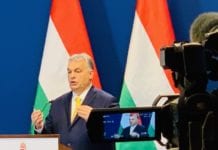By Stefan J. Bos, Chief International Correspondent BosNewsLife
SARAJEVO/BUDAPEST (BosNewsLife)– Voters in Bosnia-Herzegovina will cast ballots Sunday, October 3, in general elections that are seen as crucial for the future of the fragile former Yugoslav republic which is divided between its ethnic Croats, Muslims and Serbs. The United States has expressed concern about remaining nationalist tensions, almost 15 years after a U.S. brokered peace deal ended the Bosnian war.
American and European leaders say they hope Bosnia’s over three million voters choose politicians who will launch reforms to keep the fractured nation united and prepare it for future membership in the European Union and the North Atlantic Treaty Organization.
Reflecting the complexity of the state, voters cast ballots Sunday for a central parliament and the members of the collective presidency – one representative for each of Bosnia’s Croat, Muslim and Serb nationalities.
Additionally, voters elect deputies for assemblies of the country’s two entities, known as the Muslim-Croat Federation and the Serbs’ Republika Srpska. In Republika Srpska people also choose a new president.
The political setup grew out of the Western-backed Dayton peace agreement that ended the Bosnian war of the 1990s. That conflict, sparked by the break up of Yugoslavia, left some 100,000 dead and over two million people displaced.
Now 15 years later, U.S ambassador to Bosnia Partick Moon has urged politicians to overcome remaining nationalistic tensions following Sunday’s vote.
In a statement published by local media he said Bosnian politicians “must replace confrontation” by what he called “serious work to move Bosnia-Herzegovina into NATO and the EU.”
British and German Foreign Ministers William Hague and Guido Westerwelle have urged Bosnian leaders in a separate statement to do “their utmost to turn the page on the past” by working together for national interests.
Underscoring the difficulties is a heated debate about constitutional reforms that would strengthen central institutions.
The outgoing president of Republika Srpska, Rajko Kuzmanovic, for instance, has made clear that his Serbian entity will not accept less autonomy.
He said this week that “Bosnia should remain a complex state with two entities and three nationalities with equal rights.” Kuzmanovic made clear that “Republika Srpska will not accept constitutional changes that undermine its capacity to make seperate decisions.”
Opinion polls suggest that Kuzmanovic will be replaced by the Serbian entity’s popular Prime Minister Milorad Dodik, who denies Bosnian Serbs committed genocide and who favors independence and has questioned the future existence of Bosnia-Herzegovina.
The president of neighboring Serbia, Boris Tadic, who is also an ally of Dodik, has said he understands the concerns of Bosnia’s ethnic Serbs. Cooperation between Serbia and Republika Srpska has “significantly improved” especially in areas such as the economy, he told reporters ahead of this weekend’s ballot.
Tadic said that although Serbia “remains committed to the Dayton agreement” it would “continue to protect and respect the legitimate rights of Serbs” and all people living in the Western Balkans, as well as the territorial integrity of all Balkan countries.
But the EU has made clear that streamlined decision making is crucial for the country’s future and the economic prosperity.
Bosnia’s political and bureaucratic tangle helped make it one of the worst places to do business in Europe as the country ranks 116th in the World Bank’s ease of doing business index.
Researchers also say that that most voters, whatever their ethnic background, want politicians to focus on jobs and a brighter economic future for the divided nation.








